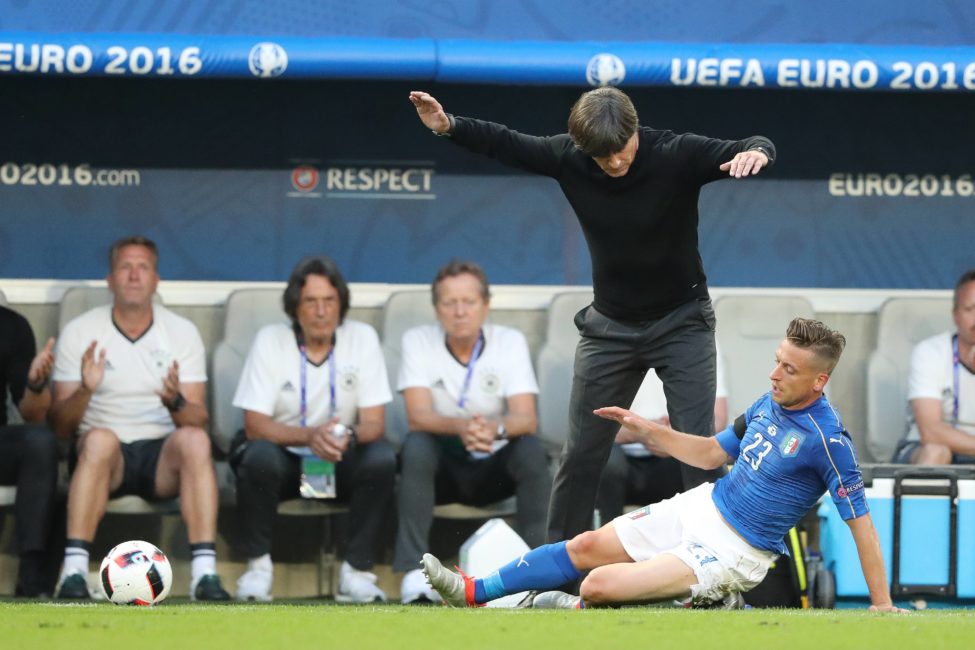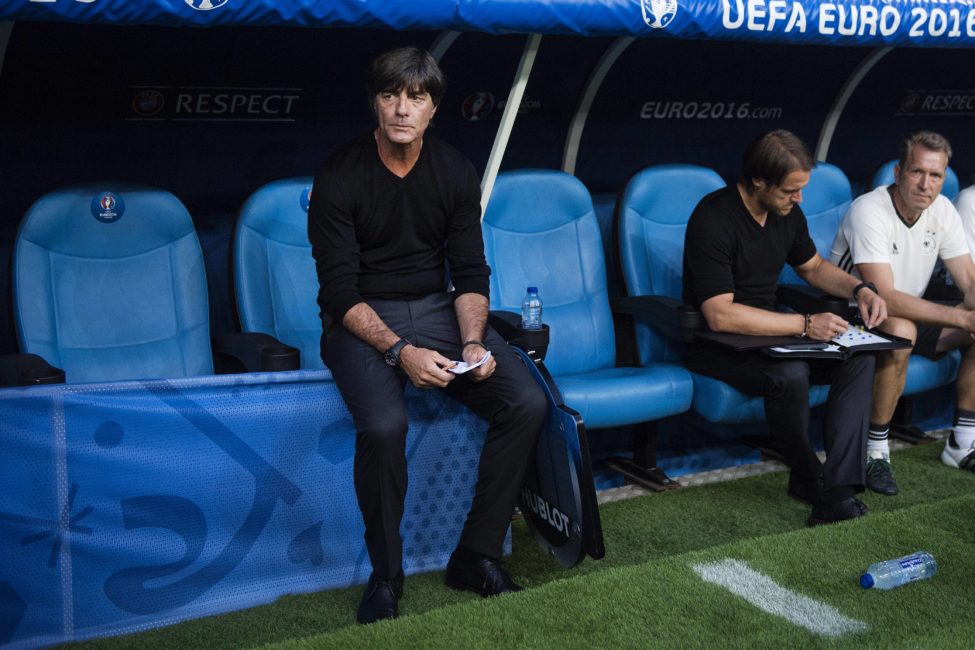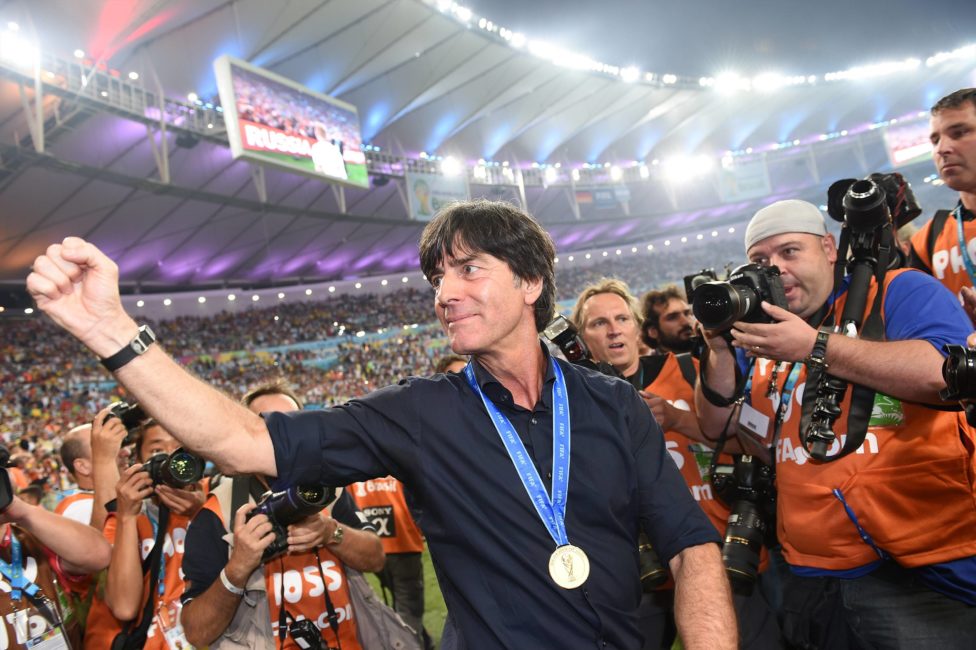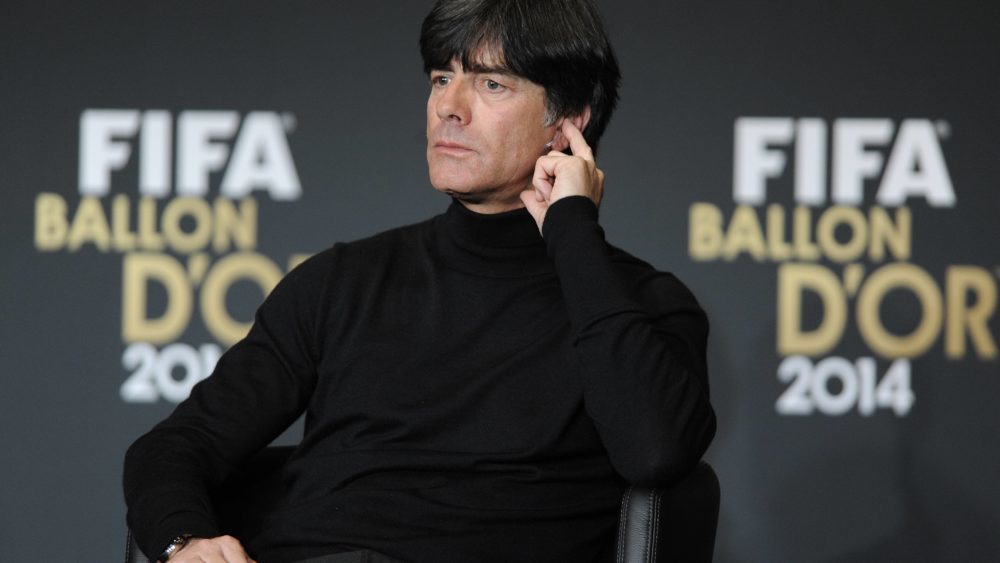The end of an era: an homage to Joachim “Jogi” Löw
It is the knockout phase of the European Championships. Germany has been drawn against an old rival. In order to minimize the perceived goal-scoring threat of their opponents, German national team coach Joachim Löw has made some adjustments. His team starts the match sitting deeper than usual. Because his counterpart has opted for a safety first approach too, both teams at first neutralize each other. There are hardly any chances to score on either side. Worse then that, neither team even brings any real goal threat worth mentioning. From the very beginning, the game seems like a heavyweight boxing match between two worn-out, tired fighters past their prime designed to be decided on points.
This is where we leave our story because no, we are not in the year 2021. I am not talking about the European Championships round of 16 match between the German national team and England. I am talking about the game that this Germany exit on Tuesday reminded me of the most. Because the events back then were as much the same up to half-time as they were fundamentally different after half-time. I am talking about the most epic of all Löw games, the Euro 2016 quarter-final against Italy.

(Image: Imago Images)
After at the time there was even less goal mouth action in the first half than was the case at Wembley now, the national coach did something he refrained from doing against England: He increased the risk by making changes. Specifically, he swapped the positions of his two eights Bastian Schweinsteiger and Mesut Özil, which benefitted especially Özil, who ended up scoring late in the game. Both players now consistently played further up the pitch, which allowed Germany’s left and right center-back to push forward more often, thus squeezing the space for Italy at the back.
This could have all gone horribly wrong, the Italians could have used the now larger spaces between the defenders for quick counterattacks on the break. But it also allowed for a big upside, which is why Jogi Löw made this bet. For him, it was not enough that his team perhaps created a goal-scoring chance sometime, he wanted to be more proactive, more decisive. And the bet paid off. In the 30 minutes after half-time, his team scored once and created another good and one absolutely outstanding goal-scoring chance, which hardly anyone except the great Gigi Buffon would have kept out.
Wavering at Wembley
This time, during the half-time break at Wembley, Joachim Löw was once again faced with the same question: Do I take risks, do I adjust things? Do I even make personell changes? Do I order more of my players to be more offensive and thus force more goal scoring chances? Knowing full well that it could also terribly backfire defensively?
As is well known, Joachim Löw decided against taking that risk, the consequences of which have meanwhile been debated to death up and down the country, for example in Tobias Escher’s fabulous European Championships diary or our very own blog (both in German).
I largely share the criticism, with the one exception that in the context of the tournament played by Germany (trailing in every game, having conceded five goals before the England match already) I can certainly understand Löw being so cautious in the first half. Planning a game on paper is one thing, but seeing it played out in the field is quite another because as soon as the game kicks off, the inherent unpredictability of the unfolding events often tear even the best laid plans to pieces. Fluctuations in form, tactical surprises by the opponent, or an approach that proves to be too brash – and before you know it, the game is lost. That is why I do not blame Jogi Löw for the first half. It is perfectly understandable for him to set up for a defensive game, especially if one is not sure where one’s team stands. My biggest gripe with Löw’s approach is how uncontested the English were allowed to grow into the game. The Germans began on the front foot and should have maintained the momentum of the a first ten really good minutes with strong pressing by Toni Kroos, Leon Goretzka and Thomas Müller. Instead, England were increasingly allowed to take control of the game without any need.
The risk-taking Löw
Part of the purpose of this article is to remind the reader that risk aversion was not always a priority with Joachim Löw. In fact, I would argue that one of his greatest strengths during his best phase as national team coach was his intelligent risk-taking. In 2012, he might have taken it a bit too far, but he did not draw the same wrong conclusions as he would later do in 2018. Time and again, he took intelligent risks at crucial moments because he always wanted to be in the driving seat with respect to the outcome of a game. It may not be a coincidence that during his extremely long tenure of 15 years, the German national team surprisingly only had to take one penalty shootout. Even the Spanish, in their all-dominant era, had to play the lottery twice.
In fact, when you get right down to it, it was sheer bad luck that forced Joachim Löw’s team to go to penalties that one time. They would have stayed in the lead in 2016 if Jérôme Boateng had not caused the most absurd penalty of his career. They might even have extended it if Mario Gómez had not been ruled out of the tournament with an injury, which upended Löw’s entire offensive plan.

(Image: Imago Images)
I will even go further with the subjunctives and say that with a fit Gómez they would have reached the final. Against France in the semi-final, the “Mannschaft” created so many first-class chances that it is all too understandable that this game is still causing Joachim Löw sleepless nights even now, five years later.
I say this because the childish bemoaning of why the team won only one title under Löw is once again running high and the whole thing is grossly unfair. Joachim Löw formed what was clearly the strongest team of the Euros 2016 and gave his team all the tools it needed to be successful. The fact that they were, frankly, too stupid to score and gave away stupid penalties (Schweinsteiger’s gift to France was even more generous than Boateng’s in the game before) cannot be blamed on Löw. In 2021, Germany actually did not create enough chances for us to be able to complain about a lack of clinical scoring, but in 2016 they did. Likewise, Löw cannot be blamed for the fact that this country simply cannot seem to bring through a skilled center-forward any more.
2016 was closer to 2021 in terms of how the game went, but there is another striking example where the Löw of the past did not shy away from taking calculated risks, but rather embraced them. In the World Cup final, Christoph Kramer, delivering a strong defensive performance in the number eight position, had to be subbed off after half an hour with an injury. The modern, risk-averse Löw would certainly have brought on a similar defensively oriented player to avoid taking too much risk at the back. But the old Löw read the game correctly and sacrificed defensive physicality for more offensive momentum. He brought on André Schürrle and gave Toni Kroos more defensive duties than he might actually have been able to handle at the time. The bet paid off, Germany increased the forward pressure and in the end it was precisely this very André Schürrle who made the golden assist.
Better teams in history won nothing
The last three or four years should not obscure the fact that Joachim Löw was not simply lucky, no, he was actually an excellent coach. His victories are not simply due to a golden generation he was fortunate enough to have at his disposal, he himself also played a huge part in them. Those who criticize that he should have won more silverware are not only ignoring the performances at the Euros 2016, but also the countless great generations of other countries that never won anything.
The Hungarians of the 50s are still considered by some to be the best national team of all time, but they went down in history never winning a title. Crujff’s Holland faltered four times at the decisive moments against teams that were actually weaker (albeit without Cruyff himself in the end). France and Spain had strong teams before their great eras, but only won one European Championship each at a time when these were not yet the big and important tournaments of today. Internationally, Zico’s Brazil is considered one of the best Brazilian teams in history, but they failed to win a World Cup. Presently, we have the examples of Belgium and a perhaps even stronger Argentina with Messi, Mascherano and other stars who keep falling short of breaking through.
It is not that easy to win a big tournament. Perhaps we in Germany are simply too spoiled with success. We have always won tournaments with such frequency that, apart from Uwe Seeler and Michael Ballack, hardly any great players have had to end their careers without winning a title with the national team. Even Oliver Kahn can call himself European champion, even if only as a substitute keeper.
No Country for Old Löw
When Joachim Löw took over, he turned from Jürgen Klinsmann’s football coach to Germany’s football coach. He taught the country how to play a back four properly, how to cover spaces properly and, for the first time in decades, how to play really beautiful, fresh, and globally recognized attacking football. That Germany’s football reputation has improved so much over the last two decades is largely thanks to him. It was also he who formed the first truly diverse national team and did not buckle even when there were fierce, sometimes even racist headwinds in 2012.

(Image: Imago Images)
And yet the last few years were bad. Very bad. One bad idea followed another and so Löw and the team got caught in a downward spiral. At least they managed to finish the Euros 2020 not too badly scathed. Sure, elimination in the round of 16 sounds bad, but they were in a strong group and against this hungry, up-and-coming England, losing on the road is not a shame. Comparisons to 2018 are inappropriate.
Löw’s future will be exciting. He will get good job offers and most likely get a chance to coach in the Champions League. The biggest question is whether he will be able to cast off the self-applied shackles of risk-aversion he has chosen to wear in recent years. There are more than a few coaches who simply lose their mojo over time, fall out of touch with the game, or suddenly start making inexplicable mistakes. Maybe Löw is one of these, or maybe he is just a classic case of a coach who at one point simply grew stale and worn out with his team.
By the way, for Julian Nagelsmann life at FC Bayern is about to begin, but his time too will come to an end at some point. If only because of FC Bayern’s penchant for German speaking coaches, Jogi Löw will always almost by default be a candidate for FC Bayern. Criticism of him may be popular, especially among Bayern fans, but they should get used to this thought sooner better than later.
Hansi Flick – Löw’s heir and student
Now Hansi Flick is about to succeed Jogi Löw at the helm of the DFB team. He seems like the perfect candidate poised for making an immediate impact. What Löw’s teams excelled at early on has been completely lost over time: Strong, thorough, coordinated pressing. It is fitting, then, that Hansi Flick’s FC Bayern were known first and foremost for their unconditional, aggressive, and high pressing. There will be no more such situations as the one during the England match when Müller encouraged his teammates to keep pushing only to be left stunned that no one heeded his call.
I can well imagine that Hansi Flick will let the national team off the leash, just as he did with FC Bayern. Particularly in Germany’s weak World Cup qualifying group, I can already see him simply lining up all the best offensive players he can find, stationing them insanely high up the pitch, and letting them run riot over the smaller nations.
The assessment becomes more difficult, however, when I think of him as a tournament coach. If there are two things he could not do at FC Bayern at all, it was good in-game personell adjustments and adjustments to the opponent’s system. But without mastering these skills, it is hard to win anything as a national coach. You may collect victories against smaller nations, but in knockout phases of big tournaments there are always those close games where victory and defeat hinge on a coach’s ability to make clever adjustments. As uncompromising as Flick was at FC Bayern, I can already picture the tabloid headlines of “thick-headed Flick”.
The good thing is that if that should come to pass, the team would at least go down with flying colors instead of leaving the spectators bored out of their minds as was the case at this year’s Euros. But neither model will bring success. Flick will have the courage that Jogi Löw recently lacked. But he will also have to be careful not to become overconfident and stubborn in his approach, which is something he could be accused of in his second year at FC Bayern.
Just as Löw should have been more like Flick in his latter days, Flick as national team coach should try to model himself more on the early Jogi Löw, who always knew how to help his team with shrewed adjustments at the right time. They is the only way he will be successful. As successful as Joachim Löw.









